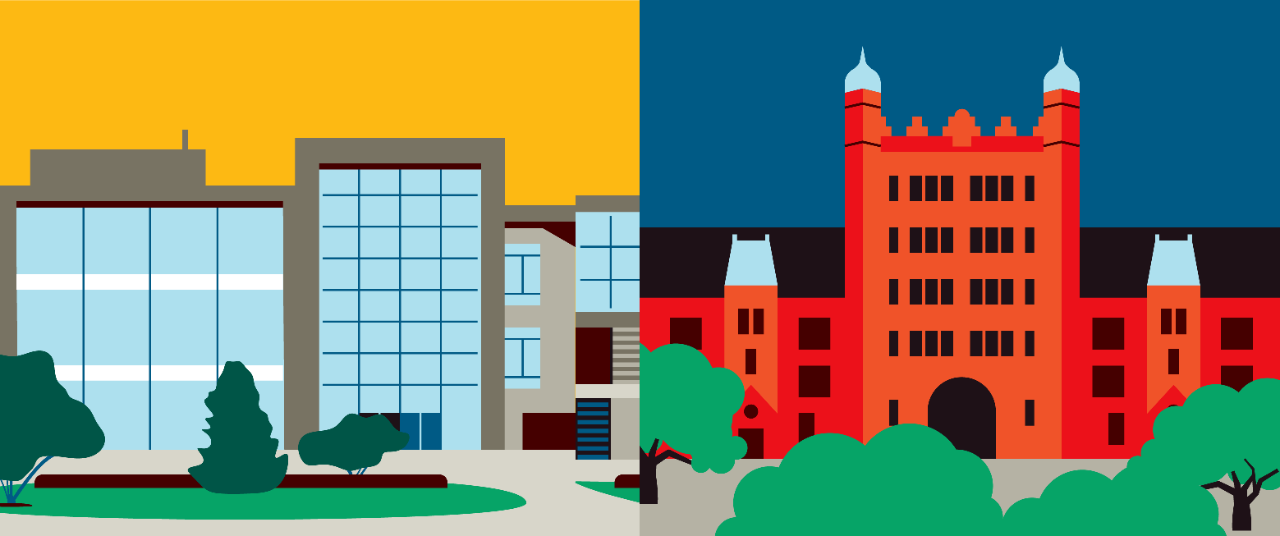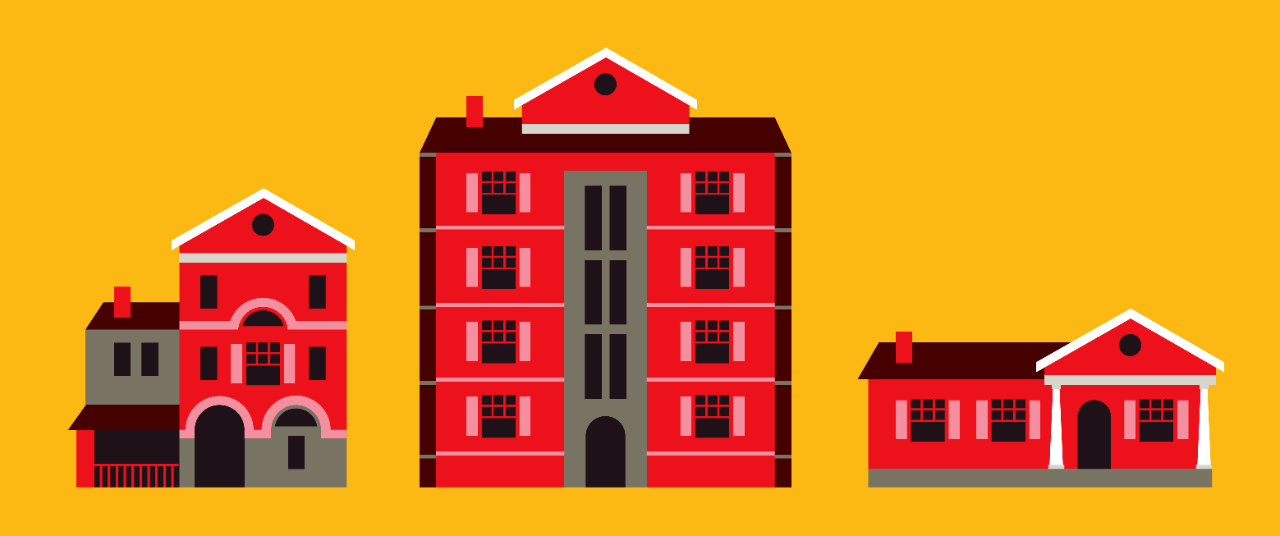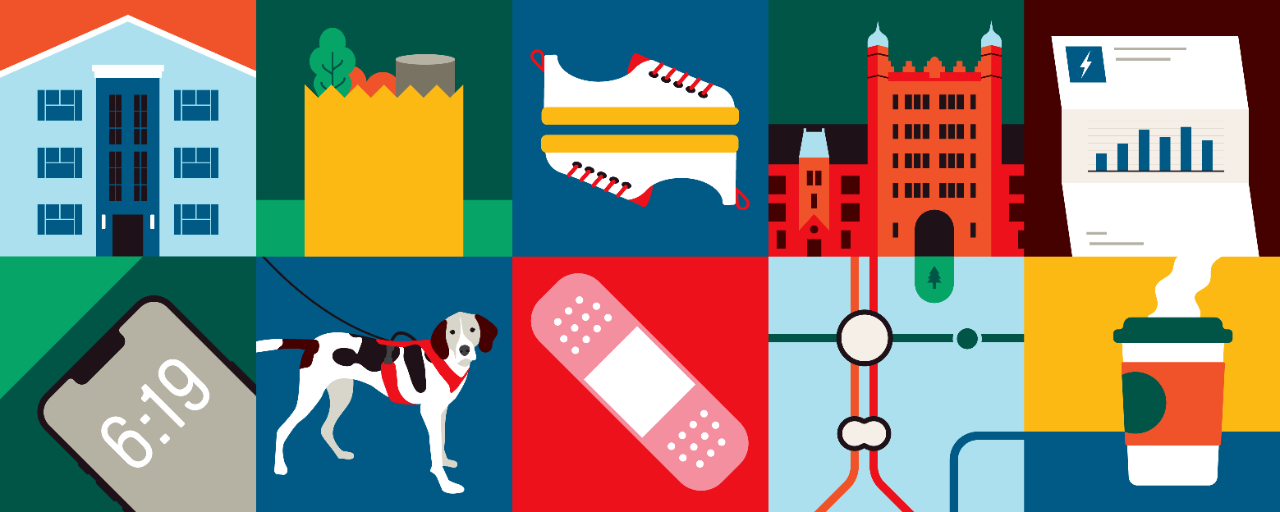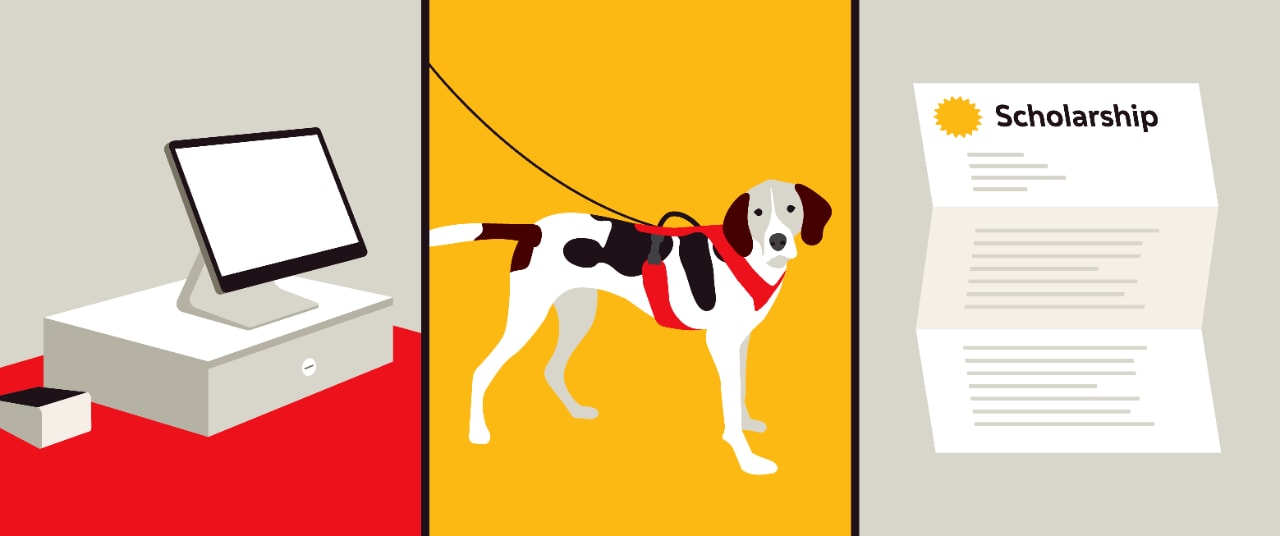Key takeaways:
If you're planning to study in Canada, you’ll have a lot of things to figure out about this next step of your life. You’ll need to know how much you’ll pay in tuition fees, where to find housing, and what to budget for living costs.
That’s a lot of homework! We're here to help with a budgeting cheat sheet so you can get top marks both in and out of the classroom.

If you’ve never done a budget before, think of this as your crash course.
A budget is a plan that breaks down your income (money coming in) and expenses (money going out). It's usually broken down monthly. If you don't know exact numbers, it’s fine to guess or estimate — or even leave items blank — while you’re putting together your student budget. Our budget is something that you will be updating through the year as you better understand how you are spending vs. saving.
One way to create one is to use a spreadsheet because they’re simple to update and do calculations. Put your title headings, income and expenses, at the top of two columns. Use each row underneath for separate items, like tuition, housing, food and entertainment.
Tip: Do you bank with Scotiabank? On the Scotiabank mobile app, you can use Scotia Smart Money by Advice+ to build a budget, track your cashflow and get personalized insights on your spending.
Chances are, you’ve never studied or lived in Canada before. So how are you supposed to know how much things cost? Let’s dive into what you need to estimate what your expenses will be.
Tuition
College or university tuition is going to be one of your largest expenses, but just how much it will be depends on a few factors. Here’s some background on how the Canadian education system works.
There are two main types of designated learning institutions in Canada — colleges and universities — and each has its own programs and fees. In general, colleges focus on applied professions or trades and offer diplomas instead of degrees. The programs might be shorter than at universities, and the tuition fees are generally less.

You can earn an undergraduate, graduate or post-graduate degree at a university, which can be necessary for getting a job in certain fields. For instance, if you want to pursue a career in engineering, science or education, you’ll likely need a related degree from a university.
Although Canada’s tuition for international students tends to be lower than in the United States or the United Kingdom, a university undergraduate degree will still cost tens of thousands of dollars.1 Tuition fees at colleges vary widely but, in general, tuition can range from $7,000 to $22,000 per year.2
To get an estimate of what you might pay for tuition, narrow down the areas of study that interest you and check the program costs on the website of the post-secondary institution. Also look into other study costs like as books and fees. (Don’t forget to update your spreadsheet with those numbers!)
Tip: Although it’s a good idea to budget for the full cost of books, you may be able to buy used from other students.
Housing and accommodations
Housing is the next big expense you’ll want to account for, and the truth is, it may not be cheap. How much you'll pay will depend on the city or town you study in, where in that city or town you live, whether you choose to live on- or off-campus, and whether you live alone or with a roommate.

Living on campus at college or university
Many Canadian schools offer on-campus residence for students, typically in shared rooms or a dormitory. This can be convenient as you're close to your classes and don't have to search for housing in an unfamiliar place. Plus, you may be able to get a meal plan to eat on-site. If you want to live on-campus, you should know that some schools only offer guaranteed residence rooms for the first year or offer residence spots through a lottery.
Residence costs vary widely, so you’ll need to check with the school you’re interested in. For instance, at the University of Toronto, costs range from around $12,000 to $35,000 for eight months.3 To compare, at Dalhousie University in Halifax, you'll pay between around $6,000 to $10,500 per academic year, and another $5,000 if you want a meal plan.4
Tip: You can save on your on-campus housing costs if you become a resident assistant (RA). RAs are peer leaders within a residence and their duties often include coordinating activities, acting as mentor to other students and promoting community.
Living off campus in private housing
The costs for off-campus housing can also vary widely. For example, living off-campus in Vancouver or Toronto will cost more than in Halifax, which is a smaller city.
Other factors affecting rental costs are how close you want to be to campus, whether or not you're willing to have roommates, and what kind of accommodations you're looking for. You can look at the average rental prices in the city you're planning to study in to help you build a student housing budget. 5
Tip: Most schools have services to help students find off-campus housing by connecting them with rental housing listings or special accommodations.

Living expenses are all the other costs associated with your daily life as a student in Canada.
You can’t study hard without the right nutrition, so you’ll want to make a realistic budget for your food. If you live in a residence with a meal plan, this is already accounted for — with the exception of meals you'll likely want to eat off-campus once in a while. You can add money for these extras as an “entertainment” line item.
If you have to buy groceries and make your own food, you’ll need to come up with a good estimate. According to Canada Food Price Guide for 2023, the average cost of groceries for a college-aged man is $340 per month. College-aged women spend an average of $300 per month.6
Here are some other living expenses you should add to your spreadsheet:
- Transportation
- Cell phone
- Utilities like electricity, heating and internet
- Clothing
- Health care
- Entertainment
- Emergencies
These expenses will vary from one person to another and from city to city.

Now that you have some idea about how much it will cost to go to school in Canada, it’s time to think about how you’ll pay your bills.
Many students take on part-time jobs or participate in work-study programs at school. If you go this route, make sure you'll still have enough time to study.
You also might be eligible for scholarships, bursaries7 or student loans. Also look for contest opportunities, Scotiabank offers a $30,000 tuition contest that runs from August to January, for more information, please see the website.
Tip: Make sure you know the rules about working in Canada as an international student.8 Find out how many hours you are allowed to work when school is in session and when classes are on break.
You’ve done a lot of work to put together your student budget, but there’s one more lesson. It’s time to set up your Canadian bank account — and the sooner the better. You might think you should wait until you’re in the country, but there are advantages to getting started before you leave home.
When you have a Canadian bank account, you’ll have access to Canadian money that you can use to pay fees. You’ll need this to open accounts like a Canadian phone plan. Also, you’ll need to prove to Immigration Canada that you have the funds to support yourself, and showing a statement from a Canadian account helps makes this easy.
Let’s look into your options before and after you move to Canada.
Student banking options before you arrive in Canada
If you have a study permit, you can look into opening an account before you arrive in Canada. With the Scotiabank International Account, students in select countries can transfer money before their move and then get set up with Scotiabank’s StartRight™ program once they are here.
If you don't yet have a study permit, the Scotiabank Student GIC Program can help the process along by proving you can meet all the requirements and pay for your expenses while you study abroad.9
Student banking options once you arrive in Canada
Once you arrive in Canada, you'll need access to everyday banking services. Luckily, there are all sorts of programs and packages designed to help you. For instance, the Scotiabank Scene+TM Student Bundle offers not only includes a student bank account, but also a Scotiabank Visa* credit card that lets you collect Scene+ points you can redeem for groceries, dining out, travel, entertainment and more. Check out all the Scotiabank student products and get helpful advice on the Student Hub.
Canada is a great place to go to school, but it's important to have a solid budget and financial plan. It's never too soon to reach out to one of our StartRight advisors so consider this your first assignment; you can connect with us before you arrive.
Get your finances in order early so you can focus on what matters most — your education.
1 https://www.canadim.com/study/
2 https://www.educanada.ca/programs-programmes/education_cost-cout_education.aspx
3 https://studentlife.utoronto.ca/task/compare-u-of-t-residence-fees/
4 https://www.dal.ca/campus_life/residence_housing/residence/halifax-campus/costs---fees.html
5 https://rentals.ca/national-rent-report
7 https://www.educanada.ca/scholarships-bourses/index.aspx
8 https://www.canada.ca/en/immigration-refugees-citizenship/services/study-canada/work.html
9 Learn what countries are eligible here: https://startright.scotiabank.com/ca/en/international-student/student-gic.html


